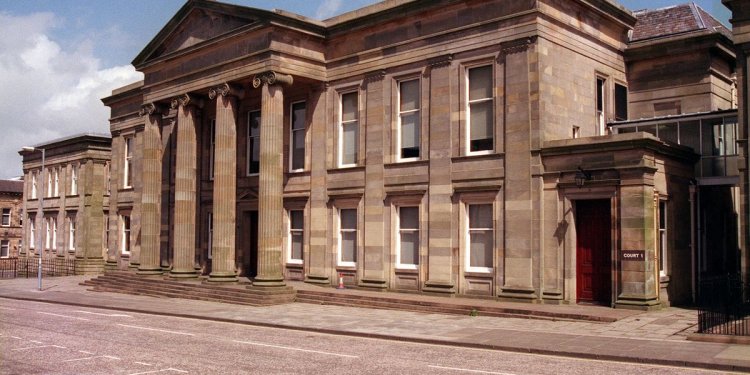
Fort William United Kingdom Sheriff Court
Nationwide Records of Scotland (NRS) obtains regular deposits of files through the Scottish sheriff process of law, the first of which is from Cupar Sheriff legal printed in 1515.
Early development
The sheriff ended up being a royal official appointed to aid the king establish control into the localities. Initial reference to a sheriff in Scotland occurs in the reign of David I (1124-53). Sheriffs performed a multitude of tasks, administrative, financial, army along with judicial. Judicially, the sheriffs managed both municipal and criminal situations and appeals plus first-time instances. Unfortuitously, the Crown's rehearse of appointing effective barons on company implied the barons used work to profit themselves, maybe not the master. More and more any office became hereditary. Another issue was the introduction of a competing system of process of law, principally the courts of regality or 'little kingdoms' in which Scottish lords could decide to try any crime except treason and in whose working the sheriffs played no component.
The sixteenth century towards Act of Union
The time is characterised because of the frustrated efforts for the Crown to remedy the abuses and inefficiencies of the sheriffs. An act of 1506 declared the king had the ability to produce sheriffdoms as he saw fit. An additional work of 1540 tried with a few success to professionalise the functions associated with judge by buying that the sheriffs follow the treatment associated with legal of Session. In 1587 and intermittently for the after century, the Crown tried to utilize justices for the peace to carry law and order toward localities. Sadly, the general weakness of this Crown in Scotland allied to your intense conservatism associated with the Scottish appropriate system intended that many of these reforms lacked teeth. The granting of heritable sheriffdoms in fact increased through the reign of Charles II (1660-85) in gratitude for their repair towards the throne.
The Act of Union to 1975
By 1700 sheriffs heard almost all of the civil and unlawful instances in Scotland, yet 21 regarding 33 sheriffdoms were held on a hereditary basis. The us government lacked the might to intervene before the Jacobite rising of 1745-6, which caused it, from 1748, to abolish many hereditary workplaces and heritable (non-royal) jurisdictions. Salaried sheriff deputes who were qualified supporters (members of the Scottish club) were now put into cost of sheriff process of law, aided by unique deputies, the sheriffs-substitute. Neither office ended up being brand new nonetheless they came to form the anchor of this county judicial system. Even though criminal abilities of sheriffs had been reduced during nineteenth century, especially in some kinds of money cases, the development of this Scottish populace, allied to developing pressures on the Court of Session, Scotland's supreme municipal judge, led to brand new legal and administrative obligations becoming given to sheriffs. Jurisdiction in little financial obligation cases, testamentary matters, maritime cases and bankruptcies were all included with the sheriffs' workload throughout the nineteenth century. The deputes and substitutes had been the forerunners of this modern-day sheriffs and sheriffs principal which currently preside over 6 sheriffdoms and 49 sheriff judge areas. Sheriffs have actually continued to obtain new functions during the twentieth century, most notably in recent times in the area of divorce proceedings.
The documents
Sheriff process of law in Scotland tend to be 2nd just in relevance to your supreme civil and unlawful process of law. Their documents, dating through the sixteenth century, have a huge array of civil, criminal and administrative product (material that is usually over looked). A summary of the key documents is down the page.
Court publications, registers and processes
Brief details of instances coming ahead of the judge including files of administrative matters. Processes later on than 1860 tend to be weeded in terms of a statutory instrument.
Workmen's compensation
The Workmen's Compensation Act, 1897 (c.37) awarded settlement to workers injured throughout work. The device had been ended by the nationwide Insurance (commercial accidents) Act, 1946 (c.67).
Fatal accident inquiries
In Scotland deadly Accident Inquiries happen held since 1895 into deadly accidents at work and instances of unexpected demise where public interest had been involved, not into deaths by committing suicide. Not absolutely all records of sheriff courtroom fatal accident inquiries have actually survived. The records of each inquiry are gradually being separately detailed as part of a recataloguing programme. To learn more see our guide on Fatal crash Inquiry records.
Sequestration files
Sheriff process of law got jurisdiction combined with the legal of Session in personal bankruptcy process (sequestration) by the Bankruptcy (Scotland) Act, 1839 (c.41). For more information see our guide on Court of Session sequestrations.
Police records
Documents of unlawful cases are in the main group of registers and operations until the end for the 19th century. The files also contain the registers of Juvenile Courts set-up by the 1908 kids Act (c.67).

















